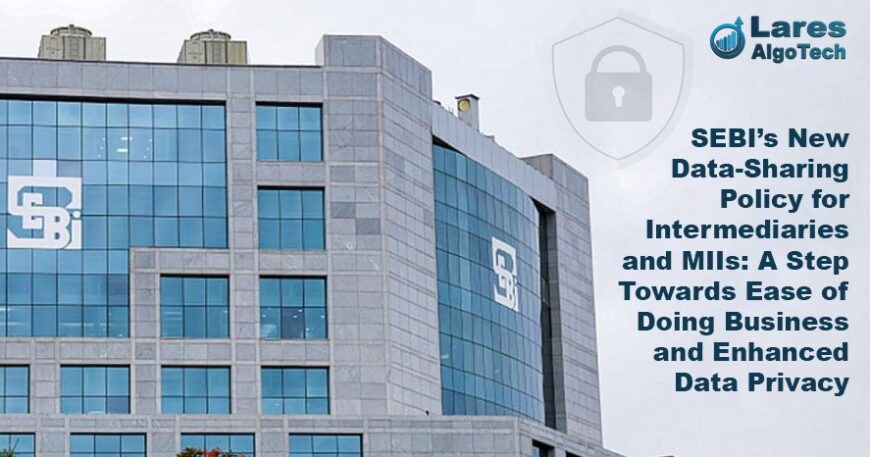In an era where data is the new currency, regulators worldwide are focusing on balancing ease of business with robust data privacy protocols. SEBI, India’s market regulator, has proposed a new data-sharing policy aimed at intermediaries and Market Infrastructure Institutions (MIIs) that promises to revolutionize business operations while upholding stringent data privacy standards.
This blog explores the key aspects of SEBI’s new policy, its impact on the financial ecosystem, and what it means for businesses and investors alike.
What is SEBI’s New Data-Sharing Policy?
SEBI’s new data-sharing framework seeks to streamline the process of data exchange between intermediaries (such as brokers, custodians, and asset management companies) and MIIs (like stock exchanges, depositories, and clearing corporations). This is part of a broader strategy to facilitate ease of doing business within the Indian financial markets while addressing data privacy concerns.
The proposed framework introduces mechanisms for secure and efficient sharing of data, ensuring that both ease of access and data integrity are maintained. SEBI intends to promote a business-friendly environment that encourages innovation, speed, and agility without compromising the safety and confidentiality of market participants’ information.
Key Features of SEBI’s Policy
- Secure Data Exchange: SEBI’s policy emphasizes building a secure ecosystem for data sharing. This involves using advanced encryption technologies and adhering to global data protection standards to prevent unauthorized access to sensitive financial information.
- Ease of Doing Business: The policy simplifies the data access process for intermediaries, thus reducing the operational bottlenecks that firms typically face when dealing with multiple entities. This will make compliance easier and faster for intermediaries and MIIs, enhancing the overall business environment.
- Transparency and Accountability: SEBI’s proposed framework aims at ensuring transparency in data handling. Intermediaries and MIIs will be held accountable for the way they collect, share, and protect user data.
- Balancing Privacy and Accessibility: By combining ease of doing business with stringent data privacy regulations, SEBI ensures that market entities can leverage data to optimize operations without compromising user privacy.
The Need for SEBI’s Data-Sharing Policy
Data has always played a crucial role in financial markets. The ability to access timely and accurate data can significantly affect the decision-making process for businesses and investors. However, as financial transactions become increasingly digitized, data privacy concerns have escalated. Breaches and misuse of financial information can lead to devastating consequences, both for individual investors and market integrity.
SEBI’s policy addresses these concerns by introducing a well-structured data-sharing mechanism that reduces the risk of data breaches while improving operational efficiency. This is particularly crucial for India, where the fintech sector is booming and financial markets are rapidly evolving.
Impact on Intermediaries and MIIs
The new data-sharing policy will impact both intermediaries and MIIs by offering:
- Operational Efficiency: Faster access to data will enable intermediaries to streamline their processes, reduce paperwork, and provide quicker turnaround times for their clients.
- Regulatory Compliance: By adhering to SEBI’s new data-sharing norms, firms can ensure that they remain compliant with the latest regulations, avoiding penalties or legal complications.
- Enhanced Data Protection: With SEBI’s emphasis on privacy and security, firms will have to adopt more robust data protection measures. This will not only safeguard their client’s information but also enhance their reputation in the market.
Implications for Investors
For investors, SEBI’s policy comes as a positive development. It ensures that their personal and financial data remains secure while intermediaries and MIIs can access the necessary information to serve them better. The faster and more secure exchange of data means more efficient services, timely updates on investments, and reduced chances of fraud or data leakage.
Moreover, as intermediaries become more compliant with global data protection standards, it enhances investor confidence in the Indian financial system, fostering a more secure investment environment.
Challenges in Implementation
While SEBI’s policy is a forward-thinking initiative, its successful implementation could face several challenges:
- Technological Readiness: Intermediaries and MIIs will need to invest in advanced technologies like encryption and blockchain to ensure secure data sharing. This could require significant financial and infrastructural upgrades, particularly for smaller firms.
- Compliance Burden: While the policy promotes ease of doing business, some firms may find it challenging to align with the stringent privacy regulations in the short term. Adapting to the new framework will require training, process adjustments, and additional compliance costs.
- Collaboration Between Entities: For the data-sharing framework to function seamlessly, there must be strong collaboration between intermediaries, MIIs, and regulators. A lack of coordination could lead to inefficiencies or data silos that defeat the purpose of the policy.
Conclusion
SEBI’s new data-sharing policy is a landmark move that aims to modernize the way intermediaries and MIIs handle data while ensuring that privacy is never compromised. By balancing ease of doing business with enhanced data security, the policy will benefit market players and investors alike, fostering greater trust and efficiency in India’s financial markets.
As SEBI continues to refine and roll out this policy, businesses must remain proactive in upgrading their systems and processes to comply with the new norms. Ultimately, the success of this initiative will depend on how well the financial ecosystem adapts to this new era of data sharing.





